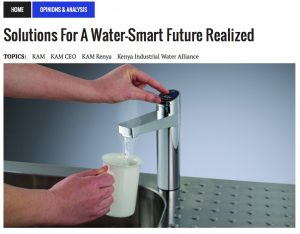BIZNEWS: Solutions For A Water-Smart Future Realized
News Source: BIZNEWS
By Phyllis Wakiaga
Continued growth and investment in our country’s largest urban centers is placing an increasing strain on water and wastewater systems. For example, water supply in Nairobi today is estimated to be 20 percent below total demand. If current trends continue, this deficit is expected to be more than 60 percent by 2035. This supply-demand gap is driven in large part by population growth, but also by a rapidly growing demand for water for industry, which comprises more than one-fifth national gross domestic product. In addition, pollution, flooding and wider land use practices in the surrounding catchment further strain the availability of existing clean water supply.
Water is a critical input for industry. In the beverage sector, for every litre of soda produced 2.5 litres of water is needed. Meanwhile, coffee production requires 200 litres per kilogram of coffee processed As Kenya aims to develop industry further by creating a competitive manufacturing sector, clean water resources will be needed to help it flourish.
As industrial water use is expected to rise by 125 percent between 2014 and 2030 alone, a collaborative approach is imperative to finding long-term sustainable solutions.
Towards a Water-Smart Industrial Future
Companies across the world are realizing that incorporating sustainable solutions into their business plans is not only socially responsible, but could also have financial benefits. By addressing environmental and social issues companies can achieve better growth and cost savings; improve their brand and reputation; strengthen stakeholder relations, and boost their bottom lines.
Motivated by the aforementioned realities, local public, private and civil society organizations are joining forces in a new partnership—the Kenya Industrial Water Alliance, also known as KIWA.
Spearheaded by the Kenya Association of Manufacturers and the Water Resources Management Authority, and supported jointly by the International Water Stewardship Programme and the Kenya 2030 Water Resources Group, KIWA provides an action-oriented platform for stakeholders to plan, design and implement activities that will increase water security in Kenya and initially in the Nairobi sub-catchment.
Initiatives like this provide hope for urban communities who in the past have suffered due to pollution associated with industrial expansion. These grievances are felt at home and across the globe, China’s largest cities, for example, have seen increases in air pollution, contaminated drinking water, water shortages, marine pollution, and deforestation. Meanwhile, addressing supply and pollution challenges is costing the Bangladeshi capital of Dhaka US $700 million per year as the country as a whole has assumed an estimated annual US $7 billion in economic losses from unimproved water and sanitation.
KIWA will help mitigate these problems, allowing government and industry to learn from both local and international best practices, while promoting a regulatory environment that encourages and incentivizes water efficiency, treatment and reuse.
Nairobi’s water management success will be largely based on preserving existing resources. Of over 3,500 “known” boreholes located in Nairobi County less than half have abstraction permits, two-thirds are unmetered, and four in five users do not pay for water. Moving forward, improved regulation and monitoring of ground water abstraction, in addition to proper management of existing data will be essential to effective and sustainable management of the city’s available water resources.
Audits, for example, have shown that Kenyan manufacturers have an opportunity to reduce water use by 20 to 30 percent on average through cost-effective interventions. KAM is already supporting the manufacturing sector to migrate into better use of water through such water and waste water resource audits. We are carrying this out at subsidized rates and we have done ten pilot audits so far in the manufacturing sector.
Meanwhile, alliance members are also doing their part. Nairobi-based Textile Company, Spinners and Spinners has already invested in systems to reuse 40 percent of its wastewater, reducing the risks to their business from water shortages, ensuring the sustainability of their water resource and providing an example for others to follow.
Working together we will be able to effectively mainstream smart-water practices into our standard organizational processes because we realize that sustainable business is good business.
The writer is the CEO of the Kenya Association of Manufacturers and the Chair of the Kenya Industrial Water Alliance. She can be reached on ceo@kam.co.ke

